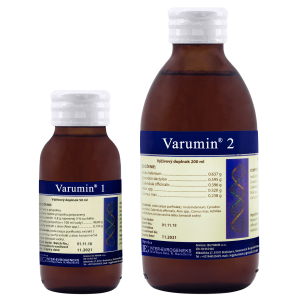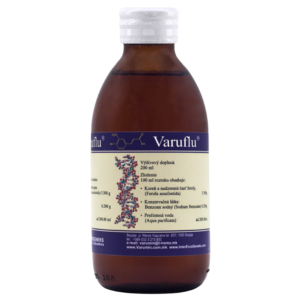Varuflu®
VARUFLU is a dietary supplement for oral administration. It is used as a supplement to the standard therapy in the treatment
of flu, hepatitis C virus and herpes simplex.
Supports the immune system and regulates liver function.
Dietary supplement - 200 ml
COMPOSITION (100 ml of the solution contains):
- Root and aerial parts from ferula (Ferula assafoetida) 3.300 g
- Preservative: Sodium benzoate 0.200 g
- Purified water (Aqua purificata) ad 200,00 ml
Dosage
Adults take VARUFFLU® 3 times a day 10 ml before eating.

Pharmacological data (Mechanism of action)
Varuflu® is a product (oral solution) which contains an aqueous extract of Ferula assafoetida, the main active ingredient of the nutritional supplement. The use of the preparation has a beneficial effect on the overall detoxification of the organism and the rapid regeneration of the weakened or damaged liver to its original healthy state of vitality and normal functioning. Furthermore, it has antibacterial, antiviral, anti-inflammatory, antipyretic and hepatoprotective action, which is why it is also recommended for viral diseases, bronchitis, asthma or pertussis.
Composition:
- Solution of 200 ml
- Aerial parts and root Ferula assafoetida 3300 g
- Purified water to 200,00 ml
Storage:
Store at room temperature (15 to 25 degrees Celsius). Keep out of the reach of children. Do not use the food supplement after the expiry date stated on the package.
Using Varuflu® with food and drinks:
It is recommended to avoid eating and drinking one hour after taking the prescribed dosage of Varuflu®.
Effects on ability to drive or use machines:
Does not affect the ability to drive or use machines.
Adverse effects: None, except slight abdominal pain, but only in the case of a strong reaction to the Ferula assafoetida plant (applies to first-time use only).
Warning
A food supplement is not an alternative or substitute for a balanced diet.
Not suitable for children, pregnant and nursing women.
In addition to detoxifying the body and blood, the liver regulates the function of a number of important hormones, maintains healthy sugar levels, produces bile and supports our immunity.
The liver is one of the most important organs in the human body. Are you taking good care of it?
When the liver is functioning optimally, everything is fine. However, when normal liver operation ceases, the health state of the organism remains seemingly preserved. The first symptoms are very inconspicuous. Most people often attribute them to stress and a fast pace of life. They include:
- Dark circles under the eyes
- Fatigue
- Insomnia
- Digestive problems
Some of the red flags you should not ignore are unpleasant breath odour, weight loss, pale stool, tongue cover, red face or brown spots on the skin. Other typical symptoms of serious liver damage are joint pains or problems with the sexual organs.
If you are experiencing pain under the right rib cage and blistered eyebrows or skin – consult with a medical professional at your earliest convenience.
What hurts us:
In a nutshell what is harming you are fatty foods, preservatives, sausages, semi-products, margarines, alcohol and even ketchup or mustard.
Psychological wellbeing is closely related to our physical health, and feeling stressed or experiencing anger has a direct negative effect on the liver.
What benefits us:
In addition to a peaceful and harmonious approach to life, the health of the liver and the human organism as a whole depends on a well-balanced and diverse diet. Whether in the context of prevention the disturbance of liver health or treating liver conditions, put the following foods into your daily menu alongside a healthy drinking regime: grapes, apricots, beans, red beets, carrots, parsley, leeks, blueberries, fish, mint, garlic, hazelnuts, shrimp, mungo beans and meat.
When the affected liver begins to fail in its irreplaceable role, it causes hormonal imbalance, metabolism disturbances, aggravation of blood clotting, as well as interruption of the normal functioning of the kidneys and the brain. Bile stones and seizures may not be the worst. Serious diseases include liver cancer, hepatitis, mononucleosis, or cirrhosis of the liver.
Hepatitis
This is an inflammatory disease of the liver. It is caused by drugs, alcohol use, or certain medical conditions. But in most cases, it's caused by a virus. The first stage is difficult to detect because it is a common viral disease. Some of the symptoms you might experience include headaches, joint pain, all over body pain, nausea, diarrhoea, or other stomach and intestinal problems can also occur. If these symptoms do not retreat after a few days, observe your body a little more thoroughly. The second stage brings a yellow colouration of the eyeballs and skin, while the tongue is wrapped under a white coat. At this stage you could be experiencing increased pain in the liver or spleen area.
There are several different hepatitis types. Hepatitis A is colloquially known as the dirty hands disease. It is most commonly transferred at festivals, camps or other collective events where the hygiene conditions are sub-standard.
Hepatitis type B is transmitted by blood and body secretions and Hepatitis type C is transmitted only by blood. The types B and C, unlike type A, may go into a chronic stage, whose danger lies in its primordial inconspicuousness. They do not have to have any symptoms. Untreated illness often results in cirrhosis and cancers.
Hepatic cancer
The jaundice can often be an entry gate for cancer. Loss of weight, prolonged elevated temperature or bend in the right leg are alarming signs. Unfortunately, despite the great advances in medicine, this type of cancer cannot be completely cured. All therapy is focused on alleviating symptoms and prolonging life. Therefore, do not underestimate any warning signals of the body, do not attribute everything to the stress, fast pace and pressure of life in the 21st century. Good health is prime and preventative examinations are crucial toward maintaining good health.





